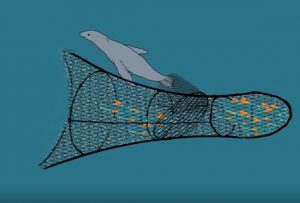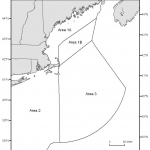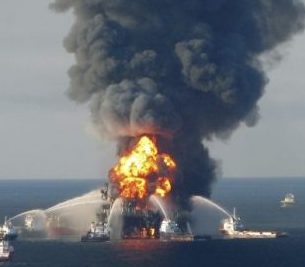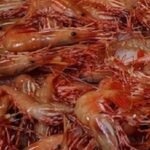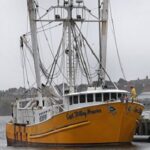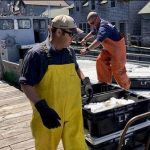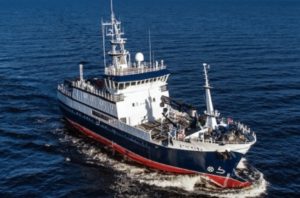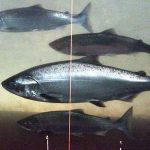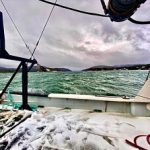Search Results for: Kitzhaber
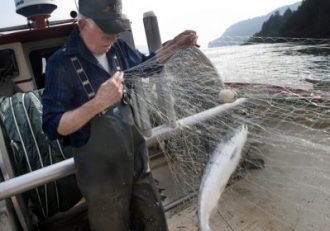
Kitzhaber’s Columbia River Reform – Gill-net issue still tangled
The Joint State Columbia River Salmon Policy Review Committee met for the first time on Jan. 17 at the Oregon Department of Fish and Wildlife headquarters in Salem, Ore. The six-member task force is charged with revising the Columbia River policy C-3620. The policy was implemented in an effort to remove non-tribal gill nets used by the commercial fishing fleets of both states from the mainstem Columbia River after an exhaustive years-long process. It was sought by sport anglers and conservationists who have long objected to commercial fishing on salmon and steelhead stocks that are federally listed as endangered. >click to read<18:39
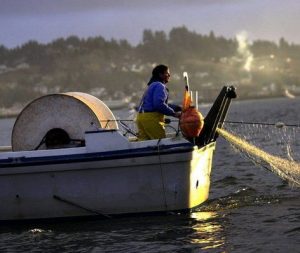
On the “Kitzhaber Plan” – Promises have not been kept
Until recently, the Columbia River gillnet fishery was a major economic driver in Wahkiakum County and the lower Columbia. The policy focused instead on recreational fishing priority, and has marginalized a fishery that sustained communities in our county and neighboring counties for 150 years. The result is that salmon have been transferred to a mostly non-local transient recreational fleet and away from local residents and economies. >click to read<10:05
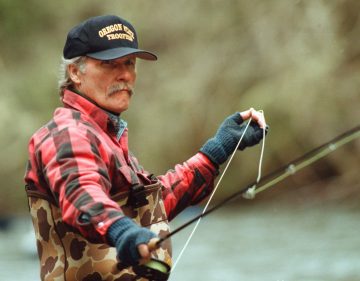
Kitzhaber re-emerges to back gillnet ban on the Columbia River
Former Gov. John Kitzhaber has re-emerged to champion a divisive plan he implemented to ban gillnets on the Columbia River — even as state fishery managers say the plan is not living up to expectations.,, Commercial fishermen argue gillnet gear is selective and does not unduly impact salmon runs, while sport fishing and conservation groups disagree. So far, neither state has come up with a replacement gear for gillnets, though Washington has continued to experiment with seine nets. >click to read<19:12
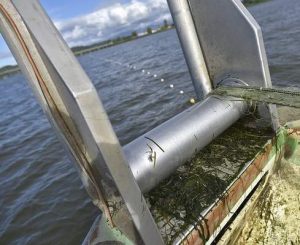
The Kitzhaber Plan – State compensation for gillnetters trickles down
Money local commercial salmon fishermen will soon receive as compensation after reform policies pushed them off the Columbia River is “not nothing.” But it’s not quite something, either. “It means a little bit of a paycheck,” said David Quashnick, a gillnetter who has been fishing since he was a teenager and now has two sons who run their own boats.,,, Recreational and salmon conservation groups said the changes would protect salmon. The commercial fishermen said it would destroy their way of life.,, In the past two years, a number of Oregon’s Fish and Wildlife commissioners say they now agree with the commercial fishermen. >click to read<10:57
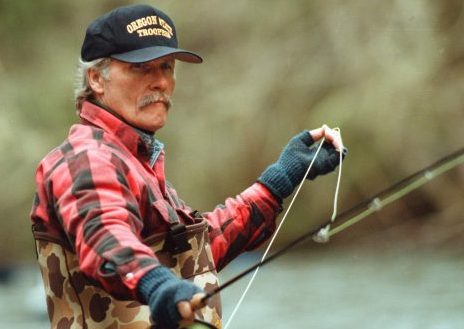
Op-Ed: Kitzhaber salmon policy failed to meet its goals – Ryan Rogers, owner of the Fisherman’s Market
Not all Oregonians are financially or physically able to take time away from work and family to catch their own Columbia River salmon. That’s where I come in: I sell Oregon’s signature fish to my customers, and they love it. My supply of salmon comes from the commercial fishing families who fish the Columbia. Some of them have been doing so for generations. However, their future — and Oregon consumers’ future supply of Columbia River salmon — is now at risk. Some politicians and special interest groups are attacking the Oregon Fish & Wildlife Commission for following fish science and Oregon law and, basically, doing its job. At its January meeting, the commission modified Gov. John Kitzhaber’s 2012 Columbia River plan. The sport-fishing interests are upset. Now, this isn’t a (fish) story about fish decline. And it’s not a story about fish conservation. Read the op-ed here 12:05
Gillnetters: Kitzhaber plan doesn’t deliver
 Lower Columbia River gillnetters told the Oregon Fish and Wildlife Commission Nov. 9 that fishery harvest reforms initiated in 2013 are not working economically, while salmon and steelhead anglers accused the commission of vacating its promise to get gillnetters off the river. As many as 150 people attended the Salem commission meeting and public forum on mainstem fishery harvest reforms, where comments were heard on a proposal by ODFW that would continue gillnetting in some areas of the mainstem river. The harvest reform package, also known as the Kitzhaber plan, is in its final year of transition and was to become fully effective at the beginning of 2017 when all Columbia River mainstem fishing would be allocated to recreational anglers and commercial gillnetters would fish in off-channel select areas, mostly in the lower river and mostly for hatchery chinook and coho salmon. However, the reform also promised to keep gillnetters economically whole, but the actual plan implementation is lagging in hatchery production of smolts, identifying additional off-channel areas and developing alternative gear that would allow commercial fishers to better target hatchery fish, among other issues. Read the rest here 10:41
Lower Columbia River gillnetters told the Oregon Fish and Wildlife Commission Nov. 9 that fishery harvest reforms initiated in 2013 are not working economically, while salmon and steelhead anglers accused the commission of vacating its promise to get gillnetters off the river. As many as 150 people attended the Salem commission meeting and public forum on mainstem fishery harvest reforms, where comments were heard on a proposal by ODFW that would continue gillnetting in some areas of the mainstem river. The harvest reform package, also known as the Kitzhaber plan, is in its final year of transition and was to become fully effective at the beginning of 2017 when all Columbia River mainstem fishing would be allocated to recreational anglers and commercial gillnetters would fish in off-channel select areas, mostly in the lower river and mostly for hatchery chinook and coho salmon. However, the reform also promised to keep gillnetters economically whole, but the actual plan implementation is lagging in hatchery production of smolts, identifying additional off-channel areas and developing alternative gear that would allow commercial fishers to better target hatchery fish, among other issues. Read the rest here 10:41
Astoria gillnetters, recreational anglers renew battle – Kitzhaber salmon plan getting tough review
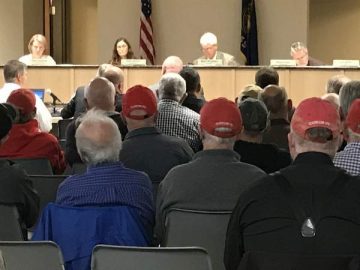 More than 100 people filled Oregon Department of Fish and Wildlife’s meeting room Wednesday as the state wildlife commission heard testimony on the status of Columbia River salmon and steelhead runs and how they are harvested by commercial and sport anglers. The commission won’t take additional action on the recommendations until December, but the argument is hot and divisive. Recreational anglers, including fishing guides and led by the Coastal Conservation Association, are furious at the proposal and consider it a betrayal of the four-year transition plan agreed to by Oregon and Washington state. Dozens of them piled into the meeting room, many wearing red CCA hats and sporting stickers proclaiming “No broken promises.” In a letter to commission members, CCA Oregon Chairman Dave Schamp said it would be irresponsible to allow the gillnet fleet’s continued use of “archaic and destructive gear.” He and others believe beach and purse seines are a viable alternative to gillnets. Commercial fishers strongly disagree. Read the story here, and read Kitzhaber salmon plan getting tough review – Read the story here 15:20
More than 100 people filled Oregon Department of Fish and Wildlife’s meeting room Wednesday as the state wildlife commission heard testimony on the status of Columbia River salmon and steelhead runs and how they are harvested by commercial and sport anglers. The commission won’t take additional action on the recommendations until December, but the argument is hot and divisive. Recreational anglers, including fishing guides and led by the Coastal Conservation Association, are furious at the proposal and consider it a betrayal of the four-year transition plan agreed to by Oregon and Washington state. Dozens of them piled into the meeting room, many wearing red CCA hats and sporting stickers proclaiming “No broken promises.” In a letter to commission members, CCA Oregon Chairman Dave Schamp said it would be irresponsible to allow the gillnet fleet’s continued use of “archaic and destructive gear.” He and others believe beach and purse seines are a viable alternative to gillnets. Commercial fishers strongly disagree. Read the story here, and read Kitzhaber salmon plan getting tough review – Read the story here 15:20
Former Oregon Gov. Kitzhaber’s salmon plan a mismatch By Hobe Kytr
 Have you ever wondered just how that salmon got to your table at the restaurant, or in the grocery store, or on your barbecue at home? Salmon not only have to swim through a lot of water, both fresh and salt, but a lot of regulations as well. But those regulations protect them, ensuring there will be salmon for future generations.The following outlines how conservation of salmon works, particularly for the Columbia River, the greatest salmon river of them all. It covers a century and a half of how people have coped with changes in the natural environment, fluctuations in fish populations, ocean conditions, pollution, control of fishing operations, as well as a host of other issues, by developing laws and structures that help ensure their survival. Read the op-ed here 12:33
Have you ever wondered just how that salmon got to your table at the restaurant, or in the grocery store, or on your barbecue at home? Salmon not only have to swim through a lot of water, both fresh and salt, but a lot of regulations as well. But those regulations protect them, ensuring there will be salmon for future generations.The following outlines how conservation of salmon works, particularly for the Columbia River, the greatest salmon river of them all. It covers a century and a half of how people have coped with changes in the natural environment, fluctuations in fish populations, ocean conditions, pollution, control of fishing operations, as well as a host of other issues, by developing laws and structures that help ensure their survival. Read the op-ed here 12:33
Oregon commission reviews impact of Former Governor Kitzhaber fishery harvest reform plan
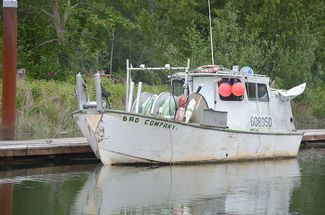 The Oregon Fish and Wildlife Commission at its March meeting reviewed fishery harvest reforms on the Columbia River that effectively remove commercial gillnetters from the mainstem river by 2017 but allows gillnetting in the lower river in select areas. The three-year transition will be complete by next year. It consists of harvest allocation shifts, with recreational anglers taking a larger chunk of the mainstem fishing while commercial fishing transitions to select off-channel areas, such as Youngs Bay and Knappa and Blind sloughs in Oregon, and Deep River and eventually to the Cathlamet Channel, all in the lower Columbia River estuary. Read the rest here 08:22
The Oregon Fish and Wildlife Commission at its March meeting reviewed fishery harvest reforms on the Columbia River that effectively remove commercial gillnetters from the mainstem river by 2017 but allows gillnetting in the lower river in select areas. The three-year transition will be complete by next year. It consists of harvest allocation shifts, with recreational anglers taking a larger chunk of the mainstem fishing while commercial fishing transitions to select off-channel areas, such as Youngs Bay and Knappa and Blind sloughs in Oregon, and Deep River and eventually to the Cathlamet Channel, all in the lower Columbia River estuary. Read the rest here 08:22
Kitzhaber’s original sin yields a disappointment
 A state-dictated transition from gillnets to seining gear to harvest Columbia River hatchery salmon continues to fail to meet expectations, according to latest results. And yet fisheries managers continue resisting a formal reassessment of the plan until next year when, supposedly, gillnetting will cease forever on the river’s main stem. The Columbia Basin Bulletin (www.cbbulletin.com) on Sept. 11 reported the latest results from the seine fishery, which was eliminated in Washington in 1935 and in Oregon in 1950, but revived by ex-Gov. John Kitzhaber when he unilaterally,,, Read the rest here 11:13
A state-dictated transition from gillnets to seining gear to harvest Columbia River hatchery salmon continues to fail to meet expectations, according to latest results. And yet fisheries managers continue resisting a formal reassessment of the plan until next year when, supposedly, gillnetting will cease forever on the river’s main stem. The Columbia Basin Bulletin (www.cbbulletin.com) on Sept. 11 reported the latest results from the seine fishery, which was eliminated in Washington in 1935 and in Oregon in 1950, but revived by ex-Gov. John Kitzhaber when he unilaterally,,, Read the rest here 11:13
Gov. Kitzhaber Throws Weight Behind Effort to Keep Coast Guard Helicopter in Newport
 Gov. John Kitzhaber has joined ranks with local residents and elected officials to keep a U.S. Coast Guard search and rescue helicopter based at the Newport airport. The governor pointed out that Newport’s importance as a commercial fishing port equals that of Coos Bay and Astoria, ports where the Coast Guard maintains aerial search and rescue capability. Read the rest here 09:12
Gov. John Kitzhaber has joined ranks with local residents and elected officials to keep a U.S. Coast Guard search and rescue helicopter based at the Newport airport. The governor pointed out that Newport’s importance as a commercial fishing port equals that of Coos Bay and Astoria, ports where the Coast Guard maintains aerial search and rescue capability. Read the rest here 09:12
Oregon Gov. John Kitzhaber’s festering dispute with the commercial fishing community comes to a head
 At the governor’s invitation, five lower Columbia River representatives met with Kitzhaber in his office at the World Trade Center in Portland. The conflict centers on a dramatic change in fish allocation and gear policy that Gov. Kitzhaber put in motion in an Aug. 9, 2012 letter to the Oregon Fish and Wildlife Commission. The essence of that shift was to end “perennial and divisive conflicts,, Read the rest here 09:55
At the governor’s invitation, five lower Columbia River representatives met with Kitzhaber in his office at the World Trade Center in Portland. The conflict centers on a dramatic change in fish allocation and gear policy that Gov. Kitzhaber put in motion in an Aug. 9, 2012 letter to the Oregon Fish and Wildlife Commission. The essence of that shift was to end “perennial and divisive conflicts,, Read the rest here 09:55
Skeptics question cash for fishermen – Kitzhaber repeats promise to help gillnetters move off Columbia main stem, video
Kitzhaber unveiled his proposed budget Monday, although it must be approved by the Legislature. It includes money for gillnetters to change their gear and some reimbursement for lost income, as well as investment in hatcheries. In answer to a question from The Daily Astorian, he said fishing traditions can be maintained – even as techniques may change. Read more
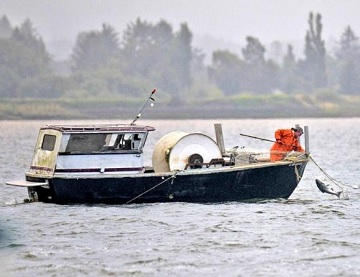
Oregon: Return to evenhanded salmon management
In Astoria in April, the Oregon Fish and Wildlife Commission learned there’s still plenty of life in commercial fishing. This may have come as a surprise, considering how some sport fishing groups have mischaracterized the industry as irrelevant. Since Washington state and Oregon co-manage Columbia River fisheries, the commission’s policies take on great importance for all who value the continuing economic and social benefits of traditional industries. Of these, salmon fishing is so deeply entwined in local culture that it may be said to comprise a key element of our heritage. Still in need of a course correction are misguided policies dictated by former Oregon Gov. John Kitzhaber. >click to read< 07:55
Op-ed: Oregon Fish & Wildlife Commission applauded for following the science
 Serving on one of Oregon’s independent commissions is often a thankless job. We owe our thanks to Oregonians who do so. It’s not easy when the issues are complex and contentious. They don’t get any more complex or contentious than fish allocation on the Columbia River. That’s why I applaud the January decision of the Oregon Fish & Wildlife Commission and take exception to unfounded criticism from some politicians and special interests groups. Commissioners followed the science and Oregon law with respect to both the 2012 Kitzhaber Columbia River plan and their duties as members of an independent commission.,, This plan merely takes harvested fish away from commercial fishing families who fish for all consumers and gives harvest opportunities to sport fishermen who can get out on the Columbia to catch their own fish. read the op-ed here 08:59
Serving on one of Oregon’s independent commissions is often a thankless job. We owe our thanks to Oregonians who do so. It’s not easy when the issues are complex and contentious. They don’t get any more complex or contentious than fish allocation on the Columbia River. That’s why I applaud the January decision of the Oregon Fish & Wildlife Commission and take exception to unfounded criticism from some politicians and special interests groups. Commissioners followed the science and Oregon law with respect to both the 2012 Kitzhaber Columbia River plan and their duties as members of an independent commission.,, This plan merely takes harvested fish away from commercial fishing families who fish for all consumers and gives harvest opportunities to sport fishermen who can get out on the Columbia to catch their own fish. read the op-ed here 08:59
Gov. Kate Brown puts political correctness above jobs
 In an astoundingly ignorant and heavy-handed display of putting urban political correctness ahead of rural jobs, Gov. Kate Brown last week dictated that the citizen members of the Oregon Fish and Wildlife Commission reverse their January decision that gave commercial fishermen a minimally fair share of the Columbia River’s salmon allocation. Addressing commissioners as if they are misbehaving children, Brown told Chairman Michael Finley the commission majority’s acknowledgment of reality is “not acceptable” and that “I expect” the commission to acquiesce to her interpretation of the facts by April 3. The commission agreed at a meeting on Friday in Tigard to take up the issue in March. Many of the most important facts are not in dispute: Former Gov. John Kitzhaber’s dictated abandonment of decades of carefully nuanced salmon policy has not worked. Kicking commercial fishermen off the Columbia’s main stem as of Dec. 31, 2016, as Kitzhaber’s plan called for, is manifestly unjust and will hurt the economy of Clatsop County and other fishing-dependent communities. Continue reading the Op-ed here 07:41
In an astoundingly ignorant and heavy-handed display of putting urban political correctness ahead of rural jobs, Gov. Kate Brown last week dictated that the citizen members of the Oregon Fish and Wildlife Commission reverse their January decision that gave commercial fishermen a minimally fair share of the Columbia River’s salmon allocation. Addressing commissioners as if they are misbehaving children, Brown told Chairman Michael Finley the commission majority’s acknowledgment of reality is “not acceptable” and that “I expect” the commission to acquiesce to her interpretation of the facts by April 3. The commission agreed at a meeting on Friday in Tigard to take up the issue in March. Many of the most important facts are not in dispute: Former Gov. John Kitzhaber’s dictated abandonment of decades of carefully nuanced salmon policy has not worked. Kicking commercial fishermen off the Columbia’s main stem as of Dec. 31, 2016, as Kitzhaber’s plan called for, is manifestly unjust and will hurt the economy of Clatsop County and other fishing-dependent communities. Continue reading the Op-ed here 07:41
Oregon did the right thing in backing off gillnet ban on the main Columbia River. Washington state should too.
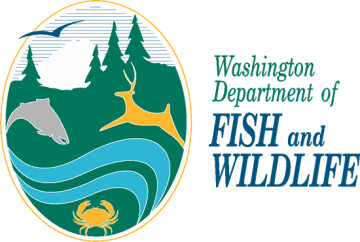 The Oregon Fish and Wildlife Commission is to be commended for recognizing that a 2013 policy dictated by former Gov. John Kitzhaber to kick commercial salmon fishing off the Columbia River has failed. It isn’t just Lower Columbia River residents who think so. Bobby Levy, former commission chair, commented on Facebook, “Oregon Fish and Wildlife commissioners did the fair and right thing! I applaud you!!” Levy led the commission in 2012 and 2013 when the two fish and wildlife commissions of Oregon and Washington state headed down the path to implementing the Kitzhaber scheme. Never fully thought out, gutting a centurylong tradition of supplying local consumers with some of the salmon we support with our taxes and electric rates was largely the product of intense lobbying by one subset of recreational fishing, embodied by the Northwest Sportsfishing Industry Association. A long-successful alliance between different salmon-fishing interests was cast aside, resulting in a loss of important unified advocacy for salmon recovery in the Columbia estuary and basin. Evicting gillnetters from the main stem of the Columbia by the end of 2016 was premised on a number of assumptions, including: Read the rest of the op-ed here 08:29
The Oregon Fish and Wildlife Commission is to be commended for recognizing that a 2013 policy dictated by former Gov. John Kitzhaber to kick commercial salmon fishing off the Columbia River has failed. It isn’t just Lower Columbia River residents who think so. Bobby Levy, former commission chair, commented on Facebook, “Oregon Fish and Wildlife commissioners did the fair and right thing! I applaud you!!” Levy led the commission in 2012 and 2013 when the two fish and wildlife commissions of Oregon and Washington state headed down the path to implementing the Kitzhaber scheme. Never fully thought out, gutting a centurylong tradition of supplying local consumers with some of the salmon we support with our taxes and electric rates was largely the product of intense lobbying by one subset of recreational fishing, embodied by the Northwest Sportsfishing Industry Association. A long-successful alliance between different salmon-fishing interests was cast aside, resulting in a loss of important unified advocacy for salmon recovery in the Columbia estuary and basin. Evicting gillnetters from the main stem of the Columbia by the end of 2016 was premised on a number of assumptions, including: Read the rest of the op-ed here 08:29
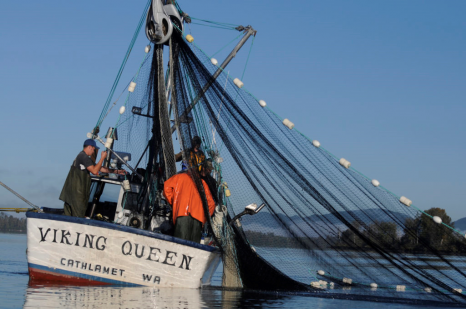
Oregon proposes ‘rebalance’ of Columbia River salmon reforms
The Oregon Department of Fish and Wildlife is proposing a “strategic rebalance” of the landmark 2012 Columbia River salmon management reforms, including continuation of gillnetting for fall chinook between Woodland and Beacon Rock. The department’s recommendations will be presented to the Oregon Fish and Wildlife Commission in a one-topic, all-day meeting beginning at 8 a.m. Wednesday at the Department of Fish and Wildlife headquarters, 4034 Fairview Industrial Drive, Salem. In late 2012 and early 2013, the Washington and Oregon commissions adopted the biggest overhaul of Columbia River salmon policies in seven decades. Jump-started by former Oregon Gov. John Kitzhaber, the policies called for allocating more chinook salmon to sportsmen in the main Columbia and restricting gillnetting to off-channel sites like Youngs Bay near Astoria. Among recommendations for 2017 developed by the Oregon Department of Fish and Wildlife are: Read the rest here 11:17
Commission to get briefed on Columbia River salmon fishing reforms
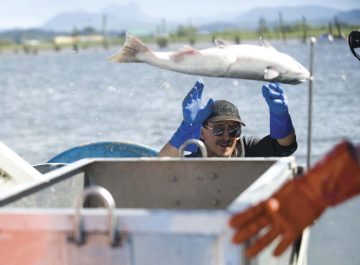 State fisheries officials will brief the Washington Fish and Wildlife Commission here Saturday on the results of the 2013-2016 transition period of the Columbia River salmon management reforms and ask for guidance heading into 2017. In late 2012 and early 2013, the Washington and Oregon commissions adopted the biggest overhaul of Columbia River salmon policies in decades. Jumpstarted by former Oregon Gov. John Kitzhaber, the policies called for allocating more chinook salmon to sportsmen in the main Columbia and restricting gillnetting to off-channel sites like Youngs Bay near Astoria. Read the rest here 10:41
State fisheries officials will brief the Washington Fish and Wildlife Commission here Saturday on the results of the 2013-2016 transition period of the Columbia River salmon management reforms and ask for guidance heading into 2017. In late 2012 and early 2013, the Washington and Oregon commissions adopted the biggest overhaul of Columbia River salmon policies in decades. Jumpstarted by former Oregon Gov. John Kitzhaber, the policies called for allocating more chinook salmon to sportsmen in the main Columbia and restricting gillnetting to off-channel sites like Youngs Bay near Astoria. Read the rest here 10:41
Seine or insane? Switch to new fishing method still clouded by practical questions
 Under a plan by disgraced former Oregon Gov. John Kitzhaber, the beginning of the end of commercial gillnet fishing on the main stem of the Columbia River is little more than a year away, but it’s still not clear if gear banned on the river for decades will ultimately replace gillnets. Oregon and Washington’s advisory group and fishery managers in both states are waiting for new information to be released that could clarify what the impacts of the proposed replacement gear — beach and purse seines — are on Columbia River salmon. Read the rest here 20:02
Under a plan by disgraced former Oregon Gov. John Kitzhaber, the beginning of the end of commercial gillnet fishing on the main stem of the Columbia River is little more than a year away, but it’s still not clear if gear banned on the river for decades will ultimately replace gillnets. Oregon and Washington’s advisory group and fishery managers in both states are waiting for new information to be released that could clarify what the impacts of the proposed replacement gear — beach and purse seines — are on Columbia River salmon. Read the rest here 20:02
Lower Columbia gillnetters want more fishing; say experimental seine fishing a failure
 Commercial gillnetters Thursday, Sept. 10, called for the two-state Columbia River Compact to cease the experimental seine fishery on the Columbia River downstream of Bonneville Dam, saying that participation is low and will get lower as catch rates lag behind goals. They also demanded more fishing time. “It all circles back to the Kitzhaber plan,” according to Jim Wells, a lower Columbia River fishing advisor. “19,000 fish have been set aside for us for September. Last year we caught that in one opening. We just don’t have the impacts (allowable catches) anymore to function and you can blame Governor Kitzhaber for that. It’s really frustrating being the only group on the river not able to fish.” Read the rest here 09:37
Commercial gillnetters Thursday, Sept. 10, called for the two-state Columbia River Compact to cease the experimental seine fishery on the Columbia River downstream of Bonneville Dam, saying that participation is low and will get lower as catch rates lag behind goals. They also demanded more fishing time. “It all circles back to the Kitzhaber plan,” according to Jim Wells, a lower Columbia River fishing advisor. “19,000 fish have been set aside for us for September. Last year we caught that in one opening. We just don’t have the impacts (allowable catches) anymore to function and you can blame Governor Kitzhaber for that. It’s really frustrating being the only group on the river not able to fish.” Read the rest here 09:37
Agencies weighing next steps in gillnet-replacement fisheries on the Columbia River
 Purse and beach seine gear could be a part of the regular Columbia River commercial salmon fishery this year, drawing from the same pool as the rest of the fleet — even when it comes to the number of fish they can keep or handle before everyone has to stop fishing. Whether or not the new seine fishery will exist has come down to a question of numbers. Specifically, which numbers.After testing seine gear on the river following a mandate from Oregon Gov. John Kitzhaber to phase out the use of commercial gillnets on the mainstem of the Columbia,,, Read the rest here 14:27
Purse and beach seine gear could be a part of the regular Columbia River commercial salmon fishery this year, drawing from the same pool as the rest of the fleet — even when it comes to the number of fish they can keep or handle before everyone has to stop fishing. Whether or not the new seine fishery will exist has come down to a question of numbers. Specifically, which numbers.After testing seine gear on the river following a mandate from Oregon Gov. John Kitzhaber to phase out the use of commercial gillnets on the mainstem of the Columbia,,, Read the rest here 14:27
Court of Appeals rejects gillnet lawsuit – may go to Oregon Supreme Court.
 A lawsuit challenging changes to the lower Columbia River gillnet policy was rejected Wednesday morning by the Oregon Court of Appeals. Steve Fick, owner of Fishhawk Fisheries, and Salmon for All President Jim Wells sued the Oregon Department of Fish and Wildlife over the process of rule-making regarding a proposed gillnet policy. The policy, created by former Gov. John Kitzhaber in August 2012, orders that gillnetting be phased out on the Columbia River’s main stem. Read the rest here 10:54
A lawsuit challenging changes to the lower Columbia River gillnet policy was rejected Wednesday morning by the Oregon Court of Appeals. Steve Fick, owner of Fishhawk Fisheries, and Salmon for All President Jim Wells sued the Oregon Department of Fish and Wildlife over the process of rule-making regarding a proposed gillnet policy. The policy, created by former Gov. John Kitzhaber in August 2012, orders that gillnetting be phased out on the Columbia River’s main stem. Read the rest here 10:54
Influence peddling, green energy, and romance: An Oregon Love Story
 When a love affair begins with shared dreams of solar panels and fantasies of switchgrass, it shouldn’t surprise us that it leads to tears, resignation and federal investigations. Such is the love story of Oregon’s former governor John Kitzhaber and his fiancée, Cylvia Hayes. “Their relationship, from its beginning in 2002,” the New York Times wrote Feb. 15 after Kitzhaber announced his resignation, “was based, friends said, on a shared passion for a low-carbon energy future.”The Department of Justice last week issued subpoenas to Oregon state agencies, as part of a federal investigation involving Kitzhaber and Hayes. Read the rest here 17:52
When a love affair begins with shared dreams of solar panels and fantasies of switchgrass, it shouldn’t surprise us that it leads to tears, resignation and federal investigations. Such is the love story of Oregon’s former governor John Kitzhaber and his fiancée, Cylvia Hayes. “Their relationship, from its beginning in 2002,” the New York Times wrote Feb. 15 after Kitzhaber announced his resignation, “was based, friends said, on a shared passion for a low-carbon energy future.”The Department of Justice last week issued subpoenas to Oregon state agencies, as part of a federal investigation involving Kitzhaber and Hayes. Read the rest here 17:52
Editorial: Englund Marine is a community asset
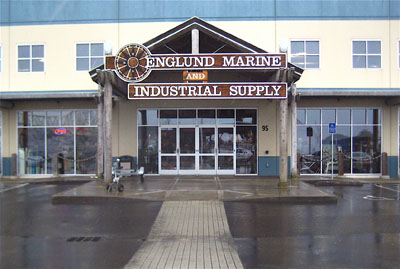 Businesses like Englund Marine are a boon to a small town. Englund Marine’s health is directly related to the health of the coastwide fishing industry. When Oregon Gov. John Kitzhaber stupidly and unilaterally curtailed gillnet fishing on the lower Columbia, Englund felt the pain of its longtime customers who ceased to invest in their boats. Kitzhaber’s ignorance reflects the myopic urban perspective on the natural resources economy. Read the rest here 11:01
Businesses like Englund Marine are a boon to a small town. Englund Marine’s health is directly related to the health of the coastwide fishing industry. When Oregon Gov. John Kitzhaber stupidly and unilaterally curtailed gillnet fishing on the lower Columbia, Englund felt the pain of its longtime customers who ceased to invest in their boats. Kitzhaber’s ignorance reflects the myopic urban perspective on the natural resources economy. Read the rest here 11:01
Editorial: We’re waiting – Gov. Kithaber made a mistake; now he can let others work things out
 Will it merely sugarcoat a bitter pill. Or will Gov. John Kitzhaber make substantive changes in his misguided order to eliminate Columbia River gillnetting? In essence, Kitzhaber moved in 2012 to end a dispute between an activist recreational fishing group (CCA) and commercial fishermen by handing the sports group a complete victory at the expense of the traditional fishing communities of the Columbia estuary. Read the rest here 13:04
Will it merely sugarcoat a bitter pill. Or will Gov. John Kitzhaber make substantive changes in his misguided order to eliminate Columbia River gillnetting? In essence, Kitzhaber moved in 2012 to end a dispute between an activist recreational fishing group (CCA) and commercial fishermen by handing the sports group a complete victory at the expense of the traditional fishing communities of the Columbia estuary. Read the rest here 13:04
“The public blowback is probably still to come,” – Oregon adopts Columbia River fishing endorsement fee

The fees are part of Gov. John Kitzhaber’s plan to end non-tribal commercial gill netting in the main Columbia River. It allows recreational anglers to catch more salmon in the main Columbia River channel by moving commercial gill-netters into off-channel areas. more@thecolumbian 13:19
ENDORSEMENT: Toss gill-net ban overboard-Measure 81 seeks to benefit sport-fishing industry- The Register-Guard
With recreational sport-fishing advocates backing away from their initiative to ban gill nets, with Gov. John Kitzhaber asking the state Fish and Wildlife Commission to consider moving gill-netters off of the Columbia River’s main stem and into shallow side areas and with tribes that hold treaty fishing rights solidly in opposition, Oregon voters should cast a confident vote against Measure 81 in the Nov. 6 election.
The measure’s sponsors, a curious coalition of conservation groups, wealthy sport fishermen and businesses that cater to them, have inaccurately depicted the 200 commercial gill-netters who work the Columbia as indiscriminate killers of marine life who threaten endangered salmon runs. http://www.registerguard.com/web/opinion/28835455-47/gill-measure-ban-netters-columbia.html.csp
Gill nets that select hatchery fish over wild? Really? You expect anyone to believe that?
Sport fishermen contribute many millions more in tax revenues than the gill netters. Why is the Opiner Of The Day advocating for reducing tax revenues? Sport fishermen are able to individually select and release wild fish.
“Five Generations” of gill netting doesn’t justify the practice any more than hundreds of generations of whaling justified their slaughter.
Restaurants and processors can get fish from commercial hatcheries.
Thats five generations of fishermen harvesting the citizens resource for them. Not everyone is capable of catching their own fish, and depend on commercial fishermen to do that for them. Commercial Hatchery’s Pig Iron? No thanks. It’s junk.






 O
O


























